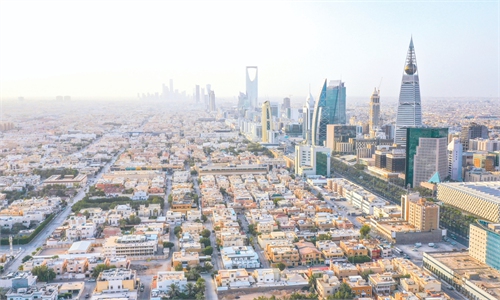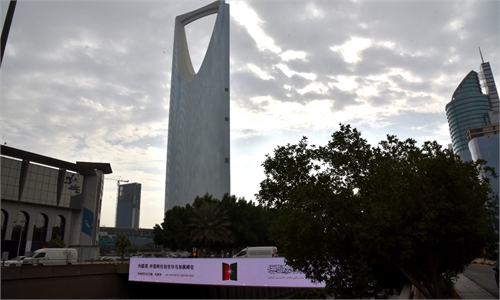IN-DEPTH / IN-DEPTH
Young population, favorable govt policies conducive to entrance of Chinese tech companies into Middle East
Fast-lane cooperation
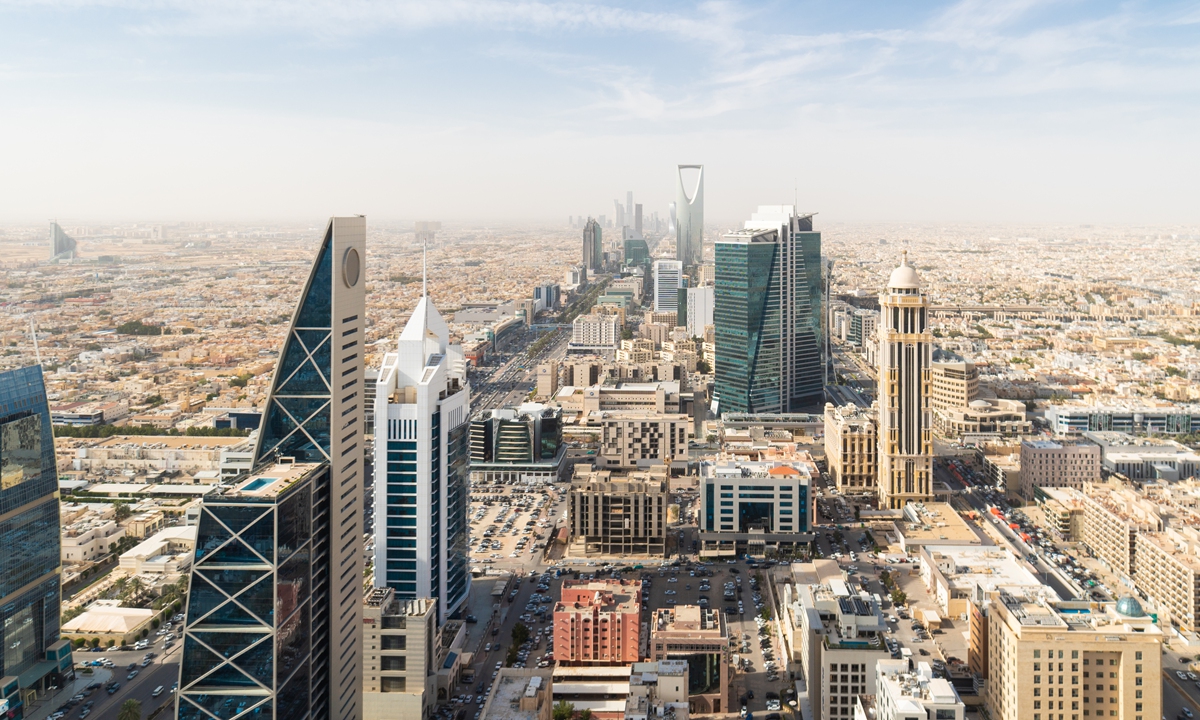
An aerial view of Riyadh, capital of Saudi Arabia Photo: VCG
Editor's Note:China's expanding and growing cooperation with the Arab countries is, once again, under the spotlight as the 10th Ministerial Conference of China-Arab States Cooperation Forum convened in Beijing on Thursday.
In recent years, cooperation between China and Middle Eastern countries has entered a "fast lane," as the oil-rich region tries to reduce its reliance on oil and turns to diversify its economy while China's development road map aligns with those countries' development strategies.
Some Chinese investors have seized the opportunity and hopped on the "fast train." Such investors have helped consolidate and expand China's cooperation with Arab countries in sectors such as high technology, green energy, and other emerging industries. For them, the Middle East is not just a mysterious land with abundant resources; it is a land full of opportunities, and with many things to explore and do. They believe the close cooperation between China and the Arab countries will help them "grow flowers in the desert."
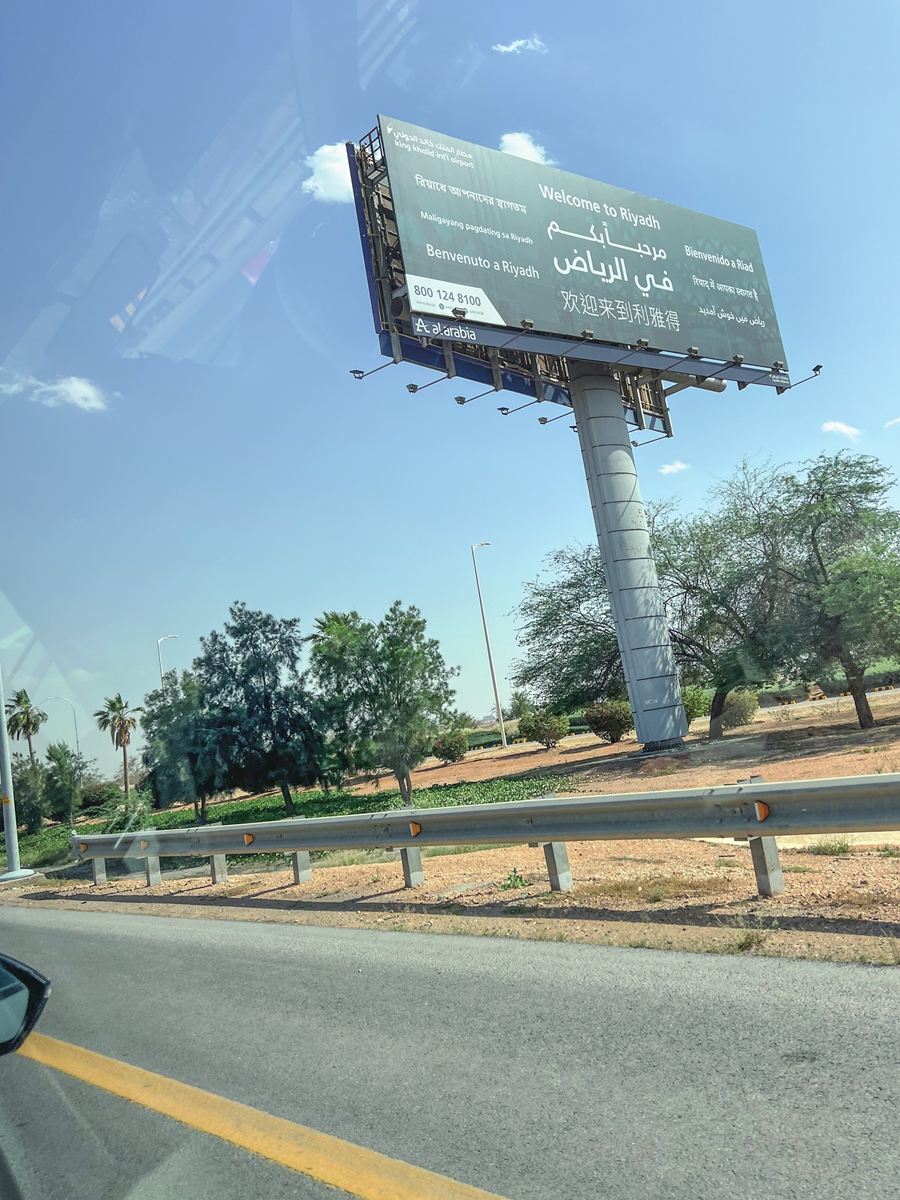
A multilingual welcome billboard along the road from Riyadh's King Khalid International Airport to the city center. Photo: Zhao Yusha/GT
Upon arriving in Riyadh, capital of Saudi Arabia, Chinese visitors are greeted with a warm welcome that makes them feel right at home. From the moment they set foot at King Khalid International Airport, they are met with signs in Chinese at the luggage claim area and multilingual signages throughout the airport in Arabic, English, and Chinese.As they make their way from the airport to the downtown area of the city, they see billboards featuring Chinese companies along the highway. Chinese electric vehicles (EVs) running on Riyadh's roads are a common scene. In addition, the convenience of using China UnionPay at various shopping malls and tourist spots in Riyadh adds to the sense of familiarity for Chinese visitors.
For most Chinese nationals, the Middle East is a land of mystery. In recent years, the mysterious land has increasingly extended its arms wide open to embrace Chinese investment, cooperation, and tourists.
The heavy Chinese presence in Riyadh, on the other hand, provides a glimpse of how China's engagement has also increased significantly in this region in the recent past.
Chinese President Xi Jinping attended the first China-Arab States Summit and the China-Gulf Cooperation Council Summit, and paid a state visit to Saudi Arabia, at the invitation of King Salman bin Abdulaziz Al Saud of Saudi Arabia, in December 2022.
Xi's 2022 visit marked the largest and highest-level diplomatic event between China and the Arab world since the founding of the People's Republic of China in 1949.
From Tuesday to Saturday, at the invitation of President Xi, Bahrain's King Hamad bin Isa Al Khalifa, Egypt's President Abdel Fattah El-Sisi, Tunisia's President Kais Saied, and the United Arab Emirates (UAE)' President Sheikh Mohamed bin Zayed Al Nahyan are paying state visits to China. They also attended the opening ceremony of the 10th Ministerial Conference of the China-Arab States Cooperation Forum on Thursday morning.
The attendance of four heads of state of Arab countries to the opening ceremony of the conference fully reflects the solidarity and cooperation between China and Arab countries, underscoring a willingness to advance China-Arab relations to the new stage, Vice Foreign Minister Deng Li said at a press briefing about the conference on Monday.
The focus would be on implementing the consensus reached by the leaders, and expanding cooperation between China and Arab countries in various fields, while accelerating the construction of a China-Arab community of shared future, said Deng.
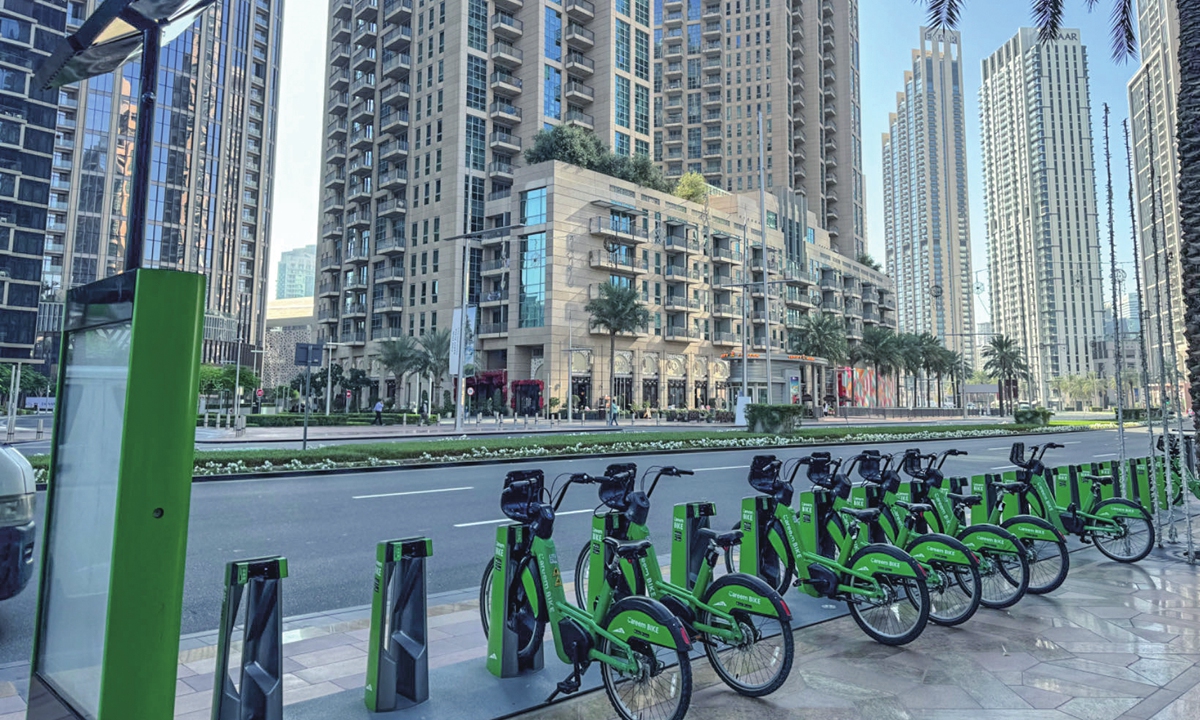
Public electric bicycles are seen parked in downtown Dubai, in December 2023. Photo: Shan Jie/GT
'Growing flowers in the desert'Some Chinese investors in the Middle East have been among the first batch to feel the increasing warmth of China-Middle East cooperation.
"In recent years, there has been a popular saying within the Chinese community that the world is looking at the Middle East. Because when we came here, we immediately felt these countries' hunger for investment, for innovation, and for shaking off their reliance on oil," Michael Chen, a Chinese national who has established a business in both Saudi Arabia and the UAE, told the Global Times.
He even made the comparison between the Middle East and China's Shenzhen, a relatively young but prosperous city in South China's Guangdong Province. "It [Middle East] is like Shenzhen 20 years ago. There are a lot of things to be done, and a lot of opportunities."
"Many people say that globalization is dead, but if you come to the Middle East, you will see a completely different picture. Chinese investment in the Middle East has been growing rapidly in recent years. We receive business teams from China every week, even every day, and governments in those Middle Eastern countries and enterprises are very eager to communicate with China," a representative of a Chinese company in the Middle East, who requested anonymity, told the Global Times on Sunday.
In recent years, Middle Eastern countries have made renewed efforts to diversify their economies away from hydrocarbons. Saudi Arabia, for example, has embarked on a rapid and ambitious social and economic transformation program under Vision 2030.
Middle Eastern countries generally have a positive outlook on China's development prospects and recognize China's international strength and status, which is a key factor in their strong cooperation with China, Zhu Yongbiao, executive director of the Research Center for the Belt and Road at Lanzhou University, told the Global Times on Tuesday.
Additionally, there is a strong complementarity in the development plans of both sides, which provides an important path for cooperation between the Middle East and China. This includes the China-proposed Belt and Road Initiative (BRI), which aligns with the long-term development plans of related countries and offers many opportunities for cooperation, said Zhu.
According to Chinese Customs data, from 2017 to 2022, China-Middle East trade volume nearly doubled from $262.5 billion to $507.2 billion. The Middle East was China's fastest-growing trading partner in 2022, with total trade volume up 27.1 percent year-on-year.
Chinese experts said that the Middle East is a region with the fastest population growth rate in the world and is endowed with a relatively young population structure, so industries closely related to young people have broad prospects in this region. The entertainment industry, gaming industry, e-commerce, and logistics and delivery services derived from the industrial chain are just such examples. Other cutting-edge technologies and high-end technology industries are also highly sought after, such as autonomous driving, artificial intelligence (AI), new-energy vehicles (NEVs), and so on.
Some Chinese high-tech companies are working closely with some Middle Eastern countries to realize a transition from an energy-dependent economic structure to a diversified high-tech economy.
China's Huawei Cloud, Tencent Cloud, and Alibaba Cloud, for example, have all cooperated with telecom services providers in the Middle East to conduct businesses.
Rachel Chen, a Chinese technology company representative, went to Saudi Arabia earlier this year for a technology exhibition. She described the trip as "eye-opening."
"Camels and automatic robots were in the same exhibition hall. Chinese tech companies were equally prominent at the exhibition with other world tech giants… I could feel the abundance of opportunities for tech companies to invest in this region," Chen told the Global Times, describing their work as "trying to grow flowers in the desert."
Several Middle Eastern countries provide conducive environments for scientists from all over the world to cooperate and conduct research, which is valuable when certain countries continue to impose restrictions on international cooperation in high-tech sectors, Lin Defu, a professor at the School of Aerospace Engineering at the Beijing Institute of Technology, who participated in a competition in Abu Dhabi with technology teams from all over the world, told the Global Times in a previous interview.
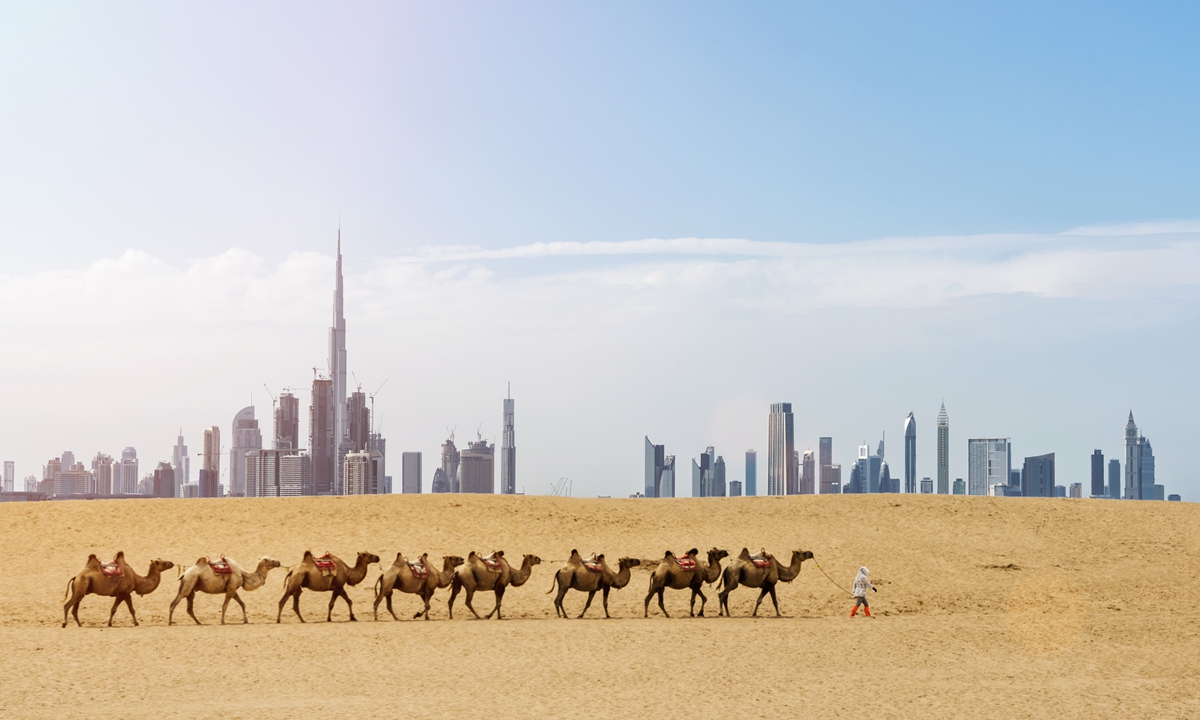
A camel train in the desert frames modern architecture and a brilliant skyline in Dubai, the United Arab Emirates. Photo: VCG
Go greenerApart from technological innovation, the green transition is now firmly in the spotlight across the Middle East as the effects of climate change become dangerously apparent.
In December 2023, Dubai hosted COP28, a conference dedicated to green and low-carbon practices. Chinese brands' efforts in global environmental conservation were also showcased at the conference.
From the start of the conference, Chinese brands such as Higer and BYD provided electric shuttle bus services to ferry attendees, with about 50 EVs from Guangdong Province providing shuttle services in the conference's "Green Zone," which is open to the public.
According to China Energy News newspaper, China's NEV industry chain is attracting the attention of Middle Eastern oil giants. Preliminary statistics show that since the beginning of 2023, China's NEV companies such as NIO, HiPhi, and Pony.ai have successively gained the attention of Middle Eastern capital.
Industry insiders believe that as China is the world's largest NEV market, its advantages in product technology and industry chain completeness have attracted considerable investments from Middle East. Combined with the energy transformation needs of the Middle Eastern countries, cooperation, as well as exchanges between Chinese enterprises and Middle Eastern countries in the high-quality NEV sector, will deepen and broaden further in the future.
Pan Kuibai, a manager at a car sales center in Dubai, told the Global Times that Chinese NEVs have certain market potential in the Middle East, not only because Chinese technologies and products have received increased recognition in recent years, but also because the Middle Eastern market is not prejudicial against Chinese products or prone to imposing political restrictions as is the case with the US and some Western countries.
Sustainable investment and climate technology are central to the diversification programs transforming the region. At Cop 28, the UAE announced the world's largest private investment vehicle for climate change action, the $30 billion ALTÉRRA fund, which aims to catalyze $250 billion of global investment by 2030. On the infrastructure side, China is involved in the world's largest energy storage project on the Red Sea coast in Saudi Arabia. There is increasing activity and more and more opportunities to partner, Mamoon Sbeih, president of the Middle East & North Africa (MENA) region at APCO Worldwide, a global communications and advocacy firm, told the Global Times.
In January 2022, when the foreign ministers of Saudi Arabia, Kuwait, Oman, Bahrain, Turkey, and Iran, as well as the secretary general of the Gulf Cooperation Council, visited China, a consensus on a green transition was achieved among the parties.
At the first China-Arab States Summit held in December 2023, China pledged to work with the Arab side to advance eight major cooperation initiatives in areas including green innovation, energy security, and others in the next three to five years.
Speaking at a seminar on China's cooperation with the Middle East in Shanghai last month, Mohammed Masbah, founder and president of the Moroccan Institute for Policy Analysis, said that more than one decade ago, non-traditional security issues in the Middle Eastern region mainly focused on counter-terrorism, but now they are slowly shifting toward climate change, water resources, and other issues.
Countries with abundant oil and gas resources such as Saudi Arabia, Qatar, and the UAE are also starting to develop clean energy and green economies, striving to reduce carbon emissions. China, having set an example in carbon emissions, can make a significant contribution to environmental diplomacy between China and the Middle East in the future, said Masbah.
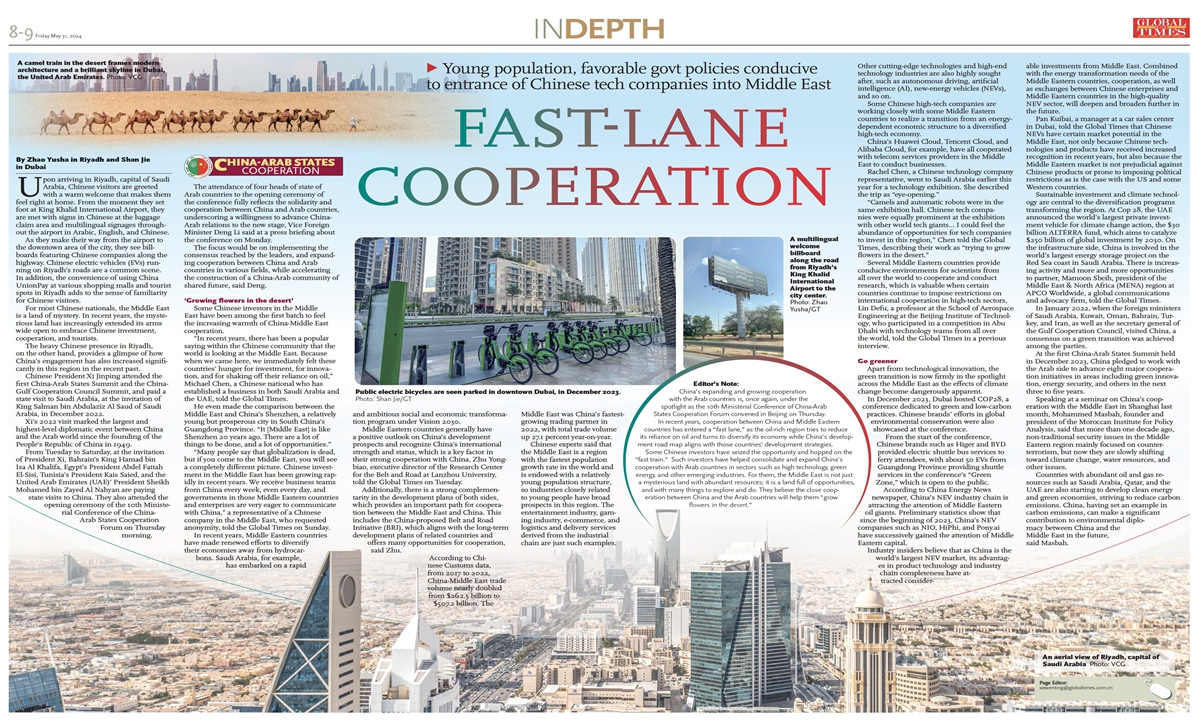
GT


